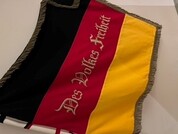Further information on research at the department can be found on the respective faculty pages.
| title | short description | |
|---|---|---|
 |
Astamadze, Giorgi: German-Georgian Cooperation in 1918. Georgia's Independence and the German-Georgian Alliance in the South Caucasus. | After the October Revolution in Russia, Georgia took the path to independence. The German Empire became an ally of the new state in May 1918. In the Georgian republic, which had grown up on the ruins of the October Revolution, Germany was seen as the representative of European civilization. Georgian nationalists had been working with Germany's military authorities since 1914 to stage an insurrection against Russia in the Caucasus. After the Bolsheviks came to power in Russia, the Georgian political elite supported secession from Moscow and German military intervention in Georgia to hold back the Young Turks as well as the Bolsheviks. For Berlin, rapprochement with Tbilisi represented a prerequisite for its Orientalist aspirations. The work (2022) examines German-Georgian relations during World War I, focusing on 1918, and is published by Brill I Schöningh (link to publisher's page). |
 |
Seiler, Georg T.: Motorized two-wheelers of the GDR in foreign trade. Export history of MZ, Simson, EMW and IWL from 1945 to 1990. | The export history of motorized two-wheelers produced in the GDR by the manufacturers MZ, Simson, EMW and IWL in the period from 1945 to 1990. The procurement of foreign currency was of central importance for the functioning of the GDR planned economy and the motorcycles and mopeds sold in over one hundred countries also made their contribution. To make sales possible, technical adaptations were necessary on the one hand, and special methods such as catalog mail order or assembly production on the other. |
| title | short description | |
|---|---|---|
WismutGmbH_rdax_178x180s.jpg) |
Cypionka, Arne: Being Nuclear? On the historical contextualization of uranium mining in Wismut (1947-1990) | The Soviet-German joint-stock company Wismut made the GDR one of the largest uranium producers of the Cold War by exploiting the deposits (among others) of the Erzgebirge. Although the company employed hundreds of thousands of people and left a clear mark - economically, in terms of the landscape, biographically and radioactively - it is hardly known today. Based on methodological considerations by historian Gabrielle Hecht, this master's thesis (February 2024) outlines various ways of approaching the history of Wismut. In addition to discursive peculiarities of the company in the field of tension between propagandistic glorification and censorship, it also focuses on possible historical contextualizations and the category of nuclear work. The transfer of Hecht's research on uranium mining in Françafrique proved to be a very enriching perspective. It can, for example, provide explanations for the socio-cultural invisibility of uranium mining and contextualize the peculiarities of uranium mining in East Germany. Abstract - Link to download. |
 |
Haine, Lina: Generational Memory: Coming to Terms with a Family History under National Socialism | This master thesis (December 2022) deals with the author's own family history, based on eyewitness interviews with her grandmother, who was born in 1932, during the National Socialist era. The focus is on the family's everyday life on the Old Mark farm and the grandmother's school years. The memories of the witness are embedded in political, social and economic processes of the years 1930 - 1945. In the course of this, a look at the research field of oral history is taken. Furthermore, this master thesis explores the question of the role of generational memory, especially in connection with the experience of the Second World War, in family history. In doing so, the question is discussed to what extent family history represents a resource of contemporary history that should be preserved. (Abstract) |
 |
Merkel, Sophia: Nationalization of childhood through children's media in the German Empire - Object story(s) from the collection "Children's Media Worlds" of the Institute for Applied Children's Media Research of the Stuttgart Media University | This master's thesis (August 2022) uses selected objects from the collection "Kindermedienwelten" (Children's Media Worlds) of the IfaK at the Stuttgart Media University to explore the nationalization process of childhood through children's media at the time of the German Empire. With its foundation in 1871, the empire represented the apparent endpoint of a long and unsteady process of unification of German states. In the following decades, a multitude of different measures intended to serve the internal formation of the empire can be observed. Alongside approaches such as the unification of infrastructures stand attempts to construct a nation with a long history through retrospectives and visions of the future. Children appeared in this system as an integral part of the "people's power." Subsequently, this work is dedicated to the question of how the nation integrated itself into the children's room and everyday life. For this purpose, four objects from the period of the German Empire in the collection "Kindermedienwelten" were examined more closely: Issues of the magazine supplement "Im Reiche der Kinder," a Laterna magica picture series, a scrapbook, and a German Red Cross postcard. Download (2 pages) |
 |
Novak, Nicolas M.: Democracy in theory, practice and memory | This Master's thesis (January 2024) is a contribution to the history of democracy by juxtaposing the theory and practice of democracy in order to highlight its lines of development, ruptures and continuities. Firstly, it illustrates that democracy is an ongoing process, both in theory and in practice. The ideas of what constitutes a democratic order change both spatially and temporally. As a result, there is no such thing as one democracy. Rather, there are many types of democracy. Secondly, it will be shown how the diversity of democratic theory, which has its roots in the history of European ideas, has affected the practical implementation of the principle of democracy and how it has been reflected in it. Therefore, the present work is divided into two thematic sections. The first part traces the development of the idea of democracy, from the assembly democracy of ancient Athens, through the era of the thinkers of the Enlightenment, to the emergence of liberal and representative democracy in the modern era. The second part examines the development of democracy in Germany from the perspective of constitutional history, focusing on the Weimar Constitution of 1919 as the foundation of the first German democracy. Abstract - Link to download |

-wikimedia-CC0-a1.jpg)